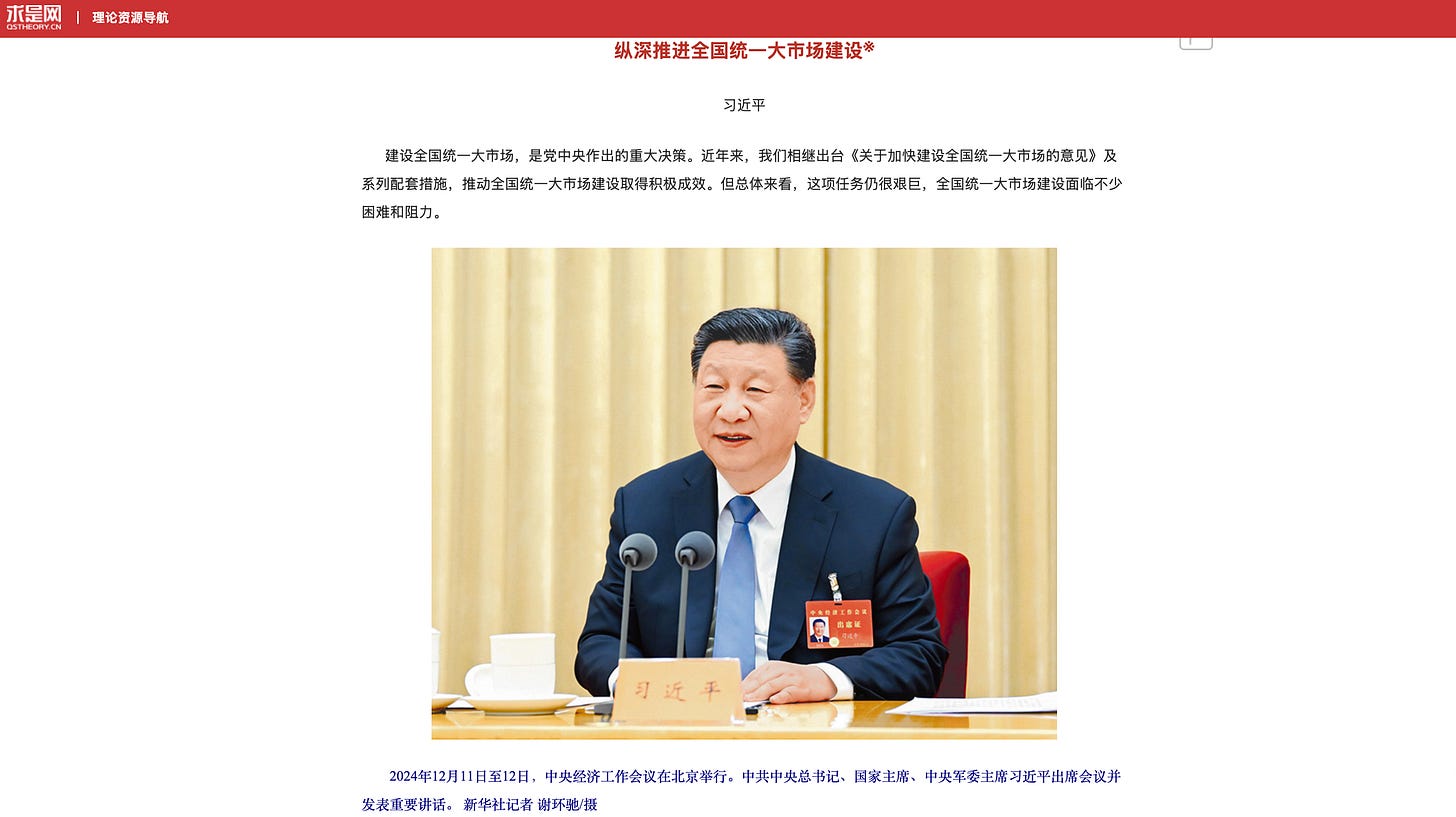Xi's detailed speech on building unified national market
Part of his speech at the 6th Meeting of the 20th Central Commission for Financial and Economic Affairs on July 1, 2025, published for the first time.
Today/On September 15, Qiushi/Seeking Truth 求是, CPC's flagship journal (the Chinese version is published biweekly and the English version bimonthly) published a piece authored by Xi Jinping, titled 纵深推进全国统一大市场建设 Deepening the Development of a Unified National Market.
The article's footnote says this is part of Xi Jinping's speech delivered at the Sixth Meeting of the 20th Central Commission for Financial and Economic Affairs on July 1, 2025. This means part of the content in this article is being published for the first time.
A comparison with the official readout of the meeting released by Xinhua reveals that this article on Qiushi expands in detail on the requirements for building a unified national market and the challenges currently faced (in other words, areas where progress has yet to be made).
Below is my full translation of the article. I have tweaked some formatting for your reading convenience.
纵深推进全国统一大市场建设
Deepening the Development of a Unified National Market
※This is part of a speech delivered by Xi Jinping at the Sixth Meeting of the 20th Central Commission for Financial and Economic Affairs on July 1, 2025.
The development of a unified national market is a significant decision made by the Central Committee of Communist Party of China (CPC). In recent years, we have successively introduced the "Opinions on Accelerating the Development of a Unified National Market" and a series of supporting measures, leading to positive results in the development of a unified national market. However, in general, this task remains formidable, and there are still many difficulties and obstacles in the development of the unified national market.
Building a unified national market is not only necessary for constructing a new development pattern and promoting high-quality development but also for gaining the initiative in international competition. As the second-largest consumer market in the world, China must build a unified national market well to strengthen our confidence in handling risks and challenges.
The basic requirement for deepening the development of the unified national market is the "five unifications and one openness."
"Five unifications" refers to (1) unifying the basic market system, especially achieving unity in property rights protection, fair competition, and quality standards; (2) unifying market infrastructure by facilitating logistics, capital flow, and information flow, while improving the modern trade circulation system; (3) unifying government behavior by clearly defining what local governments can and cannot do when promoting economic development, especially in attracting investment; (4) unifying market regulation and law enforcement by establishing clear standards for administrative penalties in market supervision; and (5) unifying the market for factor resources, promoting free flow and efficient allocation, and reducing resource misallocation and waste.
"One openness" refers to continuously expanding openness, establishing inter-connectedness between domestic and international markets, and avoiding closed-loop operations.
To implement these basic requirements, the most urgent task is to focus on key challenges and decisively eliminate deep-rooted problems.
First, focus on rectifying the chaotic low-price, disorderly competition in enterprises. In areas severely affected by "involution," we must effectively govern in accordance with the law. Industry associations should better play their role in self-discipline, guiding enterprises to improve product quality, implement a "quality over price" approach, and oppose low-priced, poor-quality goods. Promote the orderly exit of backward production capacities to achieve dynamic market clearing. Governance should integrate both online and offline sectors.
Second, focus on rectifying the chaotic issues in government procurement and bidding. Key problems include awarding contracts based on the lowest price, substandard goods, and collusion. Standardize government procurement and bidding processes, strengthen the review of the fairness of bidding results, improve regular complaint channels for enterprises, and enhance the complaint handling mechanism.
Third, focus on rectifying the chaotic issues in local government investment attraction. A national unified list of local investment promotion behaviors should be formulated, clearly specifying what is encouraged and prohibited. Establish and improve a standardized fiscal subsidy policy system. Strengthen the disclosure of investment promotion information. Strictly investigate and punish violations.
Fourth, focus on promoting the integration of domestic and foreign trade. Smooth export-to-domestic sales paths, improve consistency between domestic and international standards, build integrated service platforms for domestic and foreign trade, cultivate a group of high-quality enterprises, and conduct "Foreign Trade Premium Products China Tour" activities.
Fifth, focus on addressing gaps in laws and regulations. Revise and improve the bidding law, price law, and other laws and regulations, strengthening the rigid constraints of institutional standards. Continue to carry out special actions to standardize law enforcement related to enterprises. Improve fiscal and taxation systems, statistical accounting systems, and credit systems that are conducive to market unification.
Sixth, focus on correcting deviations in performance evaluation. Improve high-quality development assessment systems and the cadre performance evaluation system. For violations in investment promotion, local protectionism, or neglecting previous matters by new officials, timely criticism and correction should be made, with serious accountability for severe cases.
Building a unified national market is not only a battle but also a long-term endeavor. All regions and departments must implement this task with a political and holistic perspective. Coordination and cooperation among the central and local governments, between local governments, and between enterprises must be strengthened to create a unified force for progress.


